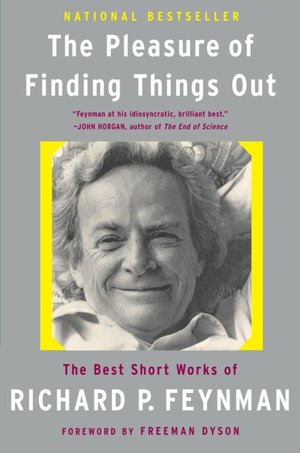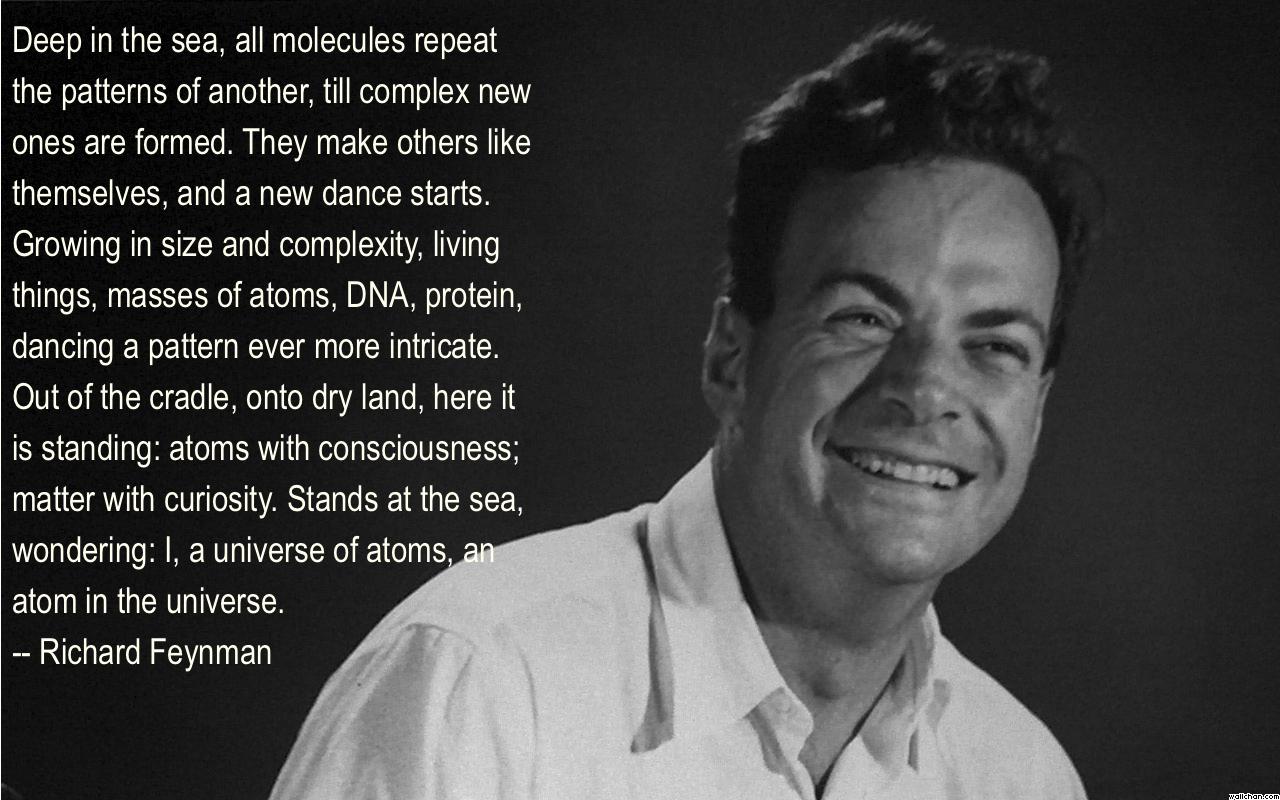Wikipedia's entry for Richard Feynman
***
Richard Feynman on the Universal Responsibility of Scientists
by Maria Popova
On harvesting the fruit of freedom of thought.
 “Writers do not merely reflect and interpret life, they inform and shape life,” E. B. White wrote of the role and responsibility of the writer.
“Writers do not merely reflect and interpret life, they inform and shape life,” E. B. White wrote of the role and responsibility of the writer.
In The Pleasure of Finding Things Out: The Best Short Works of Richard P. Feynman (public library) — the anthology that gave us The Great Explainer’s insights on the role of scientific culture in modern society, titled after the famous film of the same name — Richard Feynman adds to history’s famous definitions of science and considers the responsibility of the scientist as just about the polar opposite: to be continuously informed and shaped by life, free of the despotism of opinion and the addiction to rectitude.
Speaking to the notion that “every child is a scientist,” Feynman champions the true responsibility of science education — a responsibility and purpose sadly belied by the current education system — and argues:
When we read about this in the newspaper, it says, ‘The scientist says that this discovery may have importance in the cure of cancer.’ The paper is only interested in the use of the idea, not the idea itself. Hardly anyone can understand the importance of an idea, it is so remarkable. Except that, possibly, some children catch on. And when a child catches on to an idea like that, we have a scientist. These ideas do filter down (in spite of all the conversation about TV replacing thinking), and lots of kids get the spirit — and when they have the spirit you have a scientist. It’s too late for them to get the spirit when they are in our universities, so we must attempt to explain these ideas to children.
He then moves on to the broader role of science as a cultural force. The idea thatignorance is central to science — as well as film, media, and design — is an enduring theme, but Feynman lives up to his reputation and articulates it more beautifully and eloquently than anyone:
The scientist has a lot of experience with ignorance and doubt and uncertainty, and this experience is of very great importance, I think. When a scientist doesn’t know the answer to a problem, he is ignorant. When he has a hunch as to what the result is, he is uncertain. And when he is pretty darn sure of what the result is going to be, he is in some doubt. We have found it of paramount importance that in order to progress we must recognize the ignorance and leave room for doubt. Scientific knowledge is a body of statements of varying degrees of certainty– some most unsure, some nearly sure, none absolutely certain.
Echoing Rilke’s counsel to “live the questions,” Feynman traces the roots of science to the vital anti-authoritarianism of brave minds like Galileo and reminds us:
Now, we scientists … take it for granted that it is perfectly consistent to be unsure — that it is possible to live and not know. But I don’t know whether everyone realizes that this is true. Our freedom to doubt was born of a struggle against authority in the early days of science. It was a very deep and strong struggle. Permit us to question — to doubt, that’s all — not to be sure. And I think it is important that we do not forget the importance of this struggle and thus perhaps lose what we have gained. Here lies a responsibility to society.
With his signature blend of graceful language and uncompromising conviction, Feynman echoes Bertrand Russell’s contention that “without science, democracy is impossible” and aims at the bullseye of the scientist’s responsibility:
We are at the very beginning of time for the human race. It is not unreasonable that we grapple with problems. There are tens of thousands of years in the future. Our responsibility is to do what we can, learn what we can, improve the solutions and pass them on. It is our responsibility to leave the men of the future a free hand. In the impetuous youth of humanity, we can make grave errors that can stunt our growth for a long time. This we will do if we say we have the answers now, so young and ignorant; if we suppress all discussion, all criticism, saying, ‘This is it, boys, man is saved!’ and thus doom man for a long time to the chains of authority, confined to the limits of our present imagination. It has been done so many times before.It is our responsibility as scientists, knowing the great progress and great value of a satisfactory philosophy of ignorance, the great progress that is the fruit of freedom of thought, to proclaim the value of this freedom, to teach how doubt is not to be feared but welcomed and discussed, and to demand this freedom as our duty to all coming generations.
Pair with Feynman’s timeless commencement address on integrity and Stuart Firestein’s fantastic Ignorance: How It Drives Science, one of the best science books of 2012.

No comments:
Post a Comment